Last Mother’s Day, the Siren found herself watching the 1990 Mike Nichols film Postcards From the Edge, which is on the Criterion Channel this month. She still loves the movie, particularly Shirley MacLaine as Doris Mann, the studio-system product who can’t seem to turn off the star quality, even when she wants to. Meryl Streep, as you recall, plays Suzanne Vale, the messy daughter of Doris, who is trying to clean up both her drug addiction and her mother issues. Carrie Fisher wrote the screenplay based on her novel, which is famously something of a roman à clef about Carrie’s own relationship with her mother, Debbie Reynolds (although both Fisher and Reynolds were quick to point out the differences).
One of the last times we see Doris, she is in the hospital after an embarrassing incident involving her lavish car, a Beverly Hills tree, and (the active ingredient) a fruit smoothie with a generous glug of Stolichnaya. Nevertheless, with Suzanne’s help, Doris puts on her scarf, her white mink, and her eyebrows, and sashays out to give the press all the fabulousness they’ve come to expect. Aside from Doris’s show-stopping party performance of “I’m Still Here,” it’s the most vividly Debbie Reynolds moment in the film. Reynolds had some bad times with the press, most notably after her then-husband Eddie Fisher left her for her good friend Elizabeth Taylor. But Debbie didn’t spend the rest of her life running away from reporters. Almost to the end, she would sit down and give up the dish, or at least the dish she thought we could handle.
And this reminded the Siren of something. Over the years, the Siren saved numerous interviews with Debbie Reynolds, pulled from various databases. The collection is too vast to reprint in full. But the Siren still thought her patient readers might enjoy some excerpts. So here ya go, Debbie Reynolds, from age 54 to 79, five years before her death. The interview is ID’d at the top in boldface; Siren’s comments are in italics.
The Siren finds Debbie Reynolds smart, hilarious, and often very touching. She thinks you will, too.
“That would be so affected”: Alan Stern, The Toronto Star, July 5, 1986
Her current act, which Reynolds takes all over the country, is like a one-woman version of the old Loewe's shows.
Backed by four chorus boys, she does some singing and dancing, and…she has added comedy to her repertoire. (She does impressions of Barbra Streisand and psychologist Dr. Ruth Westheimer.)
The format suits her talents and her preferences. Good movie roles are non-existent, and television is a drag because "you have to get up at 4 in the morning."
[snip]
"I did Singin' in the Rain and she did Star Wars. They're both legendary movies, and we were both 18 when we made them," she said. [Debbie and daughter Carrie Fisher were both 19 during filming, but who’s counting. —The Siren.]
"So it's interesting to watch her career. Not," she added, "that Carrie ever asks me for advice."
Reynolds is glad that Carrie "has her own identity now; she's not just the daughter of Debbie Reynolds and Eddie Fisher." And although Carrie is looking for a way out of acting (she is working on a novel) [Ooh, guess what that will become!], Reynolds believes her daughter's career could go further than her own.
"She's very talented, and her face has such character—so good for dramatic roles," Reynolds said. "She isn't like me, with my girl-next-door face. And she wasn't stuck with a name like Debbie, which is a real ingenue name."
Did Reynolds ever consider changing her name to Deborah once she passed the ingenue stage?
"Oh come on," she grimaced. "That would be so affected, wouldn't it?"
“I think he saw a dog across the street”: The Globe and Mail, April 8, 1989
Spotted by a talent scout from nearby Warner Bros., she was signed to a $65-a-week contract and permitted studio head Jack Warner to change her name.
"I don't know how he came up with Debbie," she says. "I think he saw a dog across the street and asked his name."
[snip]
On the rebound from the Fisher fiasco and bathed in tubfuls of public sympathy, she tied the knot in 1960 with shoe tycoon Harry Karl, erstwhile husband of Marie ("The Body") McDonald. Karl, she was soon to discover, was a compulsive gambler who when he died would leave her $2 million in debt. Karl had not only gone through his own fortune but Reynolds's $7 million nest egg to boot. [This is the first of several instances where Reynolds offers an ever-changing total of how much she lost to the egregious Mr. Karl. Whatever—we can all agree he was a louse.]
She says Fisher paid only two alimony installments of $2,500 a month, [this I believe] but she bears neither him nor anyone else any grudges. According to Reynolds, most film producers consider performers in her age range unbankable and therefore unemployable, but she never waits around for the phone to ring.
Next month, she'll celebrate five years of marriage to Richard Hamlett, an affluent Virginia-born real estate developer. [Oh Debbie. Well, enjoy it while it lasts.] But it hasn't stopped her from working in Vegas, Lake Tahoe and Atlantic City most of the year—she'll soon start touring in The Unsinkable Molly Brown—and she figures she soon will have accumulated enough money to retire.
“I didn’t have time to get drunk”: Jim Becker, the Bergen Record, May 31, 1991
[NB: In this article, Harry Karl is said to have lost $21 million of his own money and $10 million of Reynolds’ money.]
It was as a spunky teen that Debbie Reynolds first gained movie stardom in such Fifties classics as Singin' in the Rain.
But it is as a funky mom that she may be remembered now, thanks to the film version of her daughter Carrie Fisher's autobiographical book, Postcards from the Edge.
The screenplay, also written by Fisher, features a blowzy, boozy Shirley MacLaine playing a character who is not based on Reynolds, thank you.
"She wrote the book, but that was not the script [director] Mike Nichols wanted," Reynolds says. "Mike wanted the competition of a mother and daughter, so Carrie had to write a completely new screenplay.
"I would like to have played the role. I tried to get an audition for the part, but Mike Nichols wanted Shirley, and I thought she did a great job. It's not about me and Carrie, but it's a very good picture. I am not an alcoholic, and whatever else the part was. I don't have time to get drunk. I work 42 weeks a year."
What she's working at most these days is her stage show, which she began performing in the mid-Sixties, and which she will be bringing to the State Theater in New Brunswick at 7:30 p.m. Saturday during the George Street Playhouse's third annual gala benefit. Tickets start at $25. [$25, that’s it? What the hell was I doing that was so important I didn’t haul myself out to New Brunswick?]
[snip]
Postcards notwithstanding, her current relationship with Carrie Fisher couldn't be better. In fact, they are now collaborating (as writer and star) on a new and decidedly offbeat TV comedy, tentatively titled Esme's Little Nap, about a woman in a coma. [One vital question: Where is this script?] "It's very provocative and very funny, and we'll see if CBS has the courage to put it on," Reynolds says.
Like most movie stars of her generation, Reynolds was a product of the Hollywood "industry"— which established her girl-next-door image and mapped out her every career move.
In the early Sixties, with the simultaneous collapse of the studio system and the drying-up of the family-film genre, she and others like her were faced with the daunting prospect of charting their own course.
"When that era ended, we all had to go on to different careers," Reynolds says.
"Doris [Day] and Donna [Reed] went into TV. A lot of others stayed at home waiting for the movies to come back. They didn't. I wasn't going to stay home waiting for them to call me. If you did sit at home, you did it for a lot of years. "
[snip]
Also on the bill: a sample of the impressions that Reynolds has been doing for her own amusement since 1956.
"I do Barbra Streisand as Yentl, and Zsa Zsa, and Dr. Ruth, Bette Davis, Mae West, and Katharine Hepburn," she says. "It started when I did a movie called The Catered Affair, with Bette Davis and Barry Fitzgerald. I loved his Irish brogue more than life, so I impersonated him. And of course, everybody does Bette."
“They won’t write about the talent, they never do”: Scott Eyman, Cox News Service, 1995
On the Hollywood memorabilia collection she had acquired and was preparing to display at her ill-fated casino in Las Vegas (prepare to weep):
She has Laurel and Hardy's derbies. Marilyn's subway dress from The Seven Year Itch. Brando's costumes from Mutiny on the Bounty. All the costumes from Showboat. "I have a lot of Judy's material, and Eleanor Powell, wonderful beaded costumes from Ann Miller and Vera Ellen, Ginger and Fred. Big ball gowns from Norma Shearer's Marie Antoinette and Romeo and Juliet. And of course there's stuff from Singin' in the Rain."
On L.B. Mayer:
"He ran a great studio. He built it. Posterity has judged his personality, but they can't misjudge his creativity. He was a harsh person with other people. But to me, he was a big papa, a teddy bear, a grandpa. He never chased me around the room or acted in an improper manner to my mother or me."
On making The Catered Affair with Richard L. Brooks, who sounds like a barrel of laughs: Though there are a long line of people still living who will gladly show you the scars that resulted from working with Bette Davis, Reynolds and she hit it off on The Catered Affair, possibly, a cynic might say, because the younger actress wasn't a threat.
"If she was better than you, if she felt she could help you, she would pass on her knowledge. If you were a wiseacre, she'd go for your throat. She didn't like showoffs. And she was not a showoff. She was like [Katharine] Hepburn, naturally powerful. 'Only work with the greats,' she told me, 'they'll make you greater.'
"I was only 21 when I worked with her” (she was actually 24) “and I didn't know from beans, and she worked very hard with me—so did Ernie Borgnine—and Brooks was screaming at me all the time, 'You Hollywood brat, you can't act your way out of a paper bag.'
"For instance, we had a cooking scene. We rehearsed three days. She was working on actually doing the cooking while she was saying her lines. Everything had to be for real. We lifted the plate on this line, we put it down on that line. It was like a dance number. She rehearsed and rehearsed and rehearsed. I was used to that for dancing, but I didn't know that it was part of acting. I had never done that before, and it's held me good for my entire career."
On Carrie Fisher’s writing and their relationship; Reynolds stars out annoyed but doesn’t stay that way:
"Occasionally, I will read her writing, if she gives me some pages. But it's not my business. She creates her own characters; if people want to assume it's me, let them. When I die, she'll write a book about me. Everybody will; you have no chance then. They'll write about me like they write about Lucille Ball or Errol Flynn. And they won't write about the talent, they never do. So, Lucille Ball was tough? Well, a lot of people are tough. I want to write a book about writers that write books. Write about people when they're alive so you can answer.
"Look, [director] Mike Nichols wanted the mother to have a problem as big as the daughter. He wanted the mother to be a drunk. I'm not a drunk, or I couldn't have worked all these years and raised children and do what I do if I had a problem."
Debbie is calming down now. Talking about the kids will do that. Her voice is growing sweeter, sentimental.
"When she was in the hospital, I took her pillows and blankets and cookies, and she wasn't supposed to have cookies. But I was so devastated, I took her cookies anyway."
And then Debbie Reynolds sighs, and imparts one final confidence.
"I've always spoiled my children."
“If I knew why I picked these kinds of men, I wouldn’t do it”: Barry Koltnow, Orange County Register, Dec. 24, 1996
Reynolds was interviewed on the set of Albert Brooks’s Mother—in the eyes of the Siren, her most delightful and rewarding late-career role.
She married shoe tycoon Harry Carl, but he had a series of business setbacks and, without Reynolds' knowledge, squandered her entire $15 million fortune. [This seems to be the estimate she gave most often.]
"What many people don't know is that in addition to the $15 million, he left me $2 million in debt, and it took me 10 years to clear the books."
Six months ago, she divorced her third husband, Richard Hamlett, whom she married 12 years ago.
"If I knew why I picked these kinds of men, I wouldn't do it," she said with a shrug. "All I know is that I'm not getting married again."
Through it all, she says, she believes that she was a good mother to her two children, which is probably why Brooks cast her in the part.
"He wanted me to be low-key and very real, and I think I've always been that kind of mother. The only difference is that the mother in the script gave up her career for her children and I didn't. But I spent a lot of time with them, even when I was working.
"The funny thing is that Albert's real mother is nothing like how he wanted me to play his mother. She came on the set the last day of shooting and started asking him questions about why he was doing this and why he was doing that.
"She was questioning his directing and he was so nervous, he was like a 2-year-old kid. I think he almost had a breakdown right there. I was laughing through the whole thing, of course, and just wished she had visited the set earlier so that I could have picked up some pointers."
“Miscellaneous items like that”: Luaine Lee, Scripps Howard News Service, Jan. 2, 1997
Reynolds discusses her third husband, Richard Hamlett, and the collapse of her Las Vegas venture:
"We bought this hotel thinking we could run it because he's a businessman and I'm in show business. We were married for 12 years. I didn't worry about running this huge place—and about one year after we bought it—he's from Virginia and he kept saying, ‘I miss Virginia. I miss Virginia.' And he did. And that was her name."
On the rottenness of her other two husbands:
When she split with Fisher she says she realized she was going to have to raise her children alone, without much financial help.
"He's never paid any attention to the children," she says, shaking her head.
Her marriage to Karl ended, she says, when she realized he had spent both his and her money.
"He was a gambling-holic. At the end of that marriage I was 39 years old and dead broke so I had to start all over again. I had his three children and my two because husbands leave - but they leave the children and dogs and cats and birds—miscellaneous items like that."
During the worst of it, she was living out of her car for a time and scrambling for roles to pay off Karl's debts. It took a decade before she was solvent again.
"I was single for 13 years," she says, "I should've stayed single.”
“I can’t … I have to paint the ladies room”: Louis B. Parks, Houston Chronicle, Jan. 19, 1997
Reynolds tells the story of getting the part [in Mother], as she tells many stories, in a comical, self-mocking style.
"My daughter was my agent for this movie," she says. "She called and said, ‘Mother, you have to fly to Los Angeles and read for Albert. You remember Albert, Mother?'
"I said, 'Oh, he's that young man you used to date; he's very cute.' Carrie said, 'Mother, it's Albert Brooks now, He's a producer and director, and he has this movie called Mother, and you have to fly in.'
"I said, ‘No dear, I can't do that. I have too much to do here (at the casino). I have to paint the ladies room tomorrow.' She said ‘Mother, don't argue with me; just get on a plane and come to Los Angeles' ."
Here we go—new article, new number:
A second marriage to a wealthy businessman, shoe mogul Harry Karl, ended after twelve years, when, she says, he lost both of their fortunes.
"He was a gamble-holic person, and that means he lost $30 million," Reynolds says. "At the end of that marriage I was 39 years old and dead broke, so I had to start all over.”
“I always want to pick up the phone and advise Britney Spears”: Terry Loncaric, Post-Tribune, Aug. 1, 2008
An article written around the time that Carrie Fisher was co-hosting with Robert Osborne on TCM’s The Essentials.
She still remembers how difficult it was to endure one of Hollywood's most public divorces with Eddie Fisher, Carrie's father. She helped daughter Carrie deal with bouts of depression and addiction issues.
"I always want to pick up the phone and advise Britney Spears," Reynolds said. "The paparazzi is looking to bring down today's stars instead of encouraging them. When I was divorcing Eddie Fisher, I couldn't leave the house or take my kids to the park. The paparazzi were in my front yard."
[snip]
Reynolds is proud of her film roles and loved her daughter Carrie's tribute to her film career on the Turner Classic Movies channel. "I wasn't sure what Carrie was going to say in the tribute, and some of what she said surprised me," Reynolds said. "You don't script Carrie. You don't script me. We just talk from our hearts. I thought the tribute was quite wonderful."
[snip]
[This section of the article is called “Reynolds' revelations”]
Best movie kiss: Glenn Ford. "He has good lips."
Worst movie kiss: Tony Randall. "He's not exactly romantic. He's thinking about the opera while he's kissing you."
Strangest movie: "I was in this very obscure murder mystery musical, 'What's the Matter with Helen? Even though it was a weird picture, I loved making it. I worked very hard, and I think I was very good in it."
Most likable movie role: The Unsinkable Molly Brown. "She was unsinkable. She had great courage, she was confrontational and she was controversial."
Advice to young stars: "Try not to be a member of the pack or a groupie. If you can, be proud of being an individual."
What she'd like on her tombstone: "I've had one helluva ride!"
“I could never get the industry in back of it”: Joe Meyers, McClatchy-Tribune Regional News, April 7, 2011
Today, Reynolds faces a very difficult decision in her life -- auctioning off the mammoth collection of movie memorabilia she has been storing away.
The collection began with Reynolds stepping in and purchasing the MGM holdings that were about to be dumped in 1970—when new management at the studio decided to divest itself 0f its own history—and continued with other important finds (ranging from Marilyn Monroe's "subway dress" in The Seven Year Itch through set pieces from Cleopatra).
Valued at more than $20 million, the collection was always intended to go to a museum devoted to Hollywood history, but that didn't happen.
[Apropos of nothing, kids, the Academy of Motion Picture Arts and Sciences broke ground on their Academy Museum four years later, in 2015; its final cost was around $482 million for the building alone. But who needs a bunch of costumes, right?]
"It was a very hard decision, but I could never get the industry in back of it," the star said.
Reynolds began to choke up as she talked about the Los Angeles auction coming up in June.
"I'm just trying to get through it. But I know that I have to open another door and walk another path."
“Don’t look at the numbers”: Stephen Kopfinger, Lancaster New Era/Intelligencer Journal/Sunday News, Nov. 14, 2010
Reynolds, 78, pays little attention to her age.
"Don't look at the numbers," Reynolds said. "Just look at how you feel."
Still, she does like sticking close to home. Daughter Carrie lives nearby ("She's very funny," Reynolds said), and after arduous days on the road, Reynolds likes to look after her daughter's dog.
"It's a real life," Reynolds said, "when you come home."
“We were both fortunate”: Frank Rizzo, Hartford Courant, April 10, 2011
Debbie Reynolds is having a long, tough day. The 79-year-old actress had fielded close to 20 calls that morning seeking her thoughts about the death of Elizabeth Taylor, her friend, her marital rival and, finally, her friend again.
"She was beautiful, an icon, a legend," says Reynolds, speaking from her home in Los Angeles. She and Taylor chatted on the phone about once a month, "just to say hello," she says. Their conflict from when Reynolds' then-husband Eddie Fisher left her for Taylor was but a distant memory.
What Reynolds now likes to recall was when they were both young actresses in Hollywood before becoming older and wiser women.
"We were both fortunate, but she was the one who had the more brilliant career," Reynolds says.




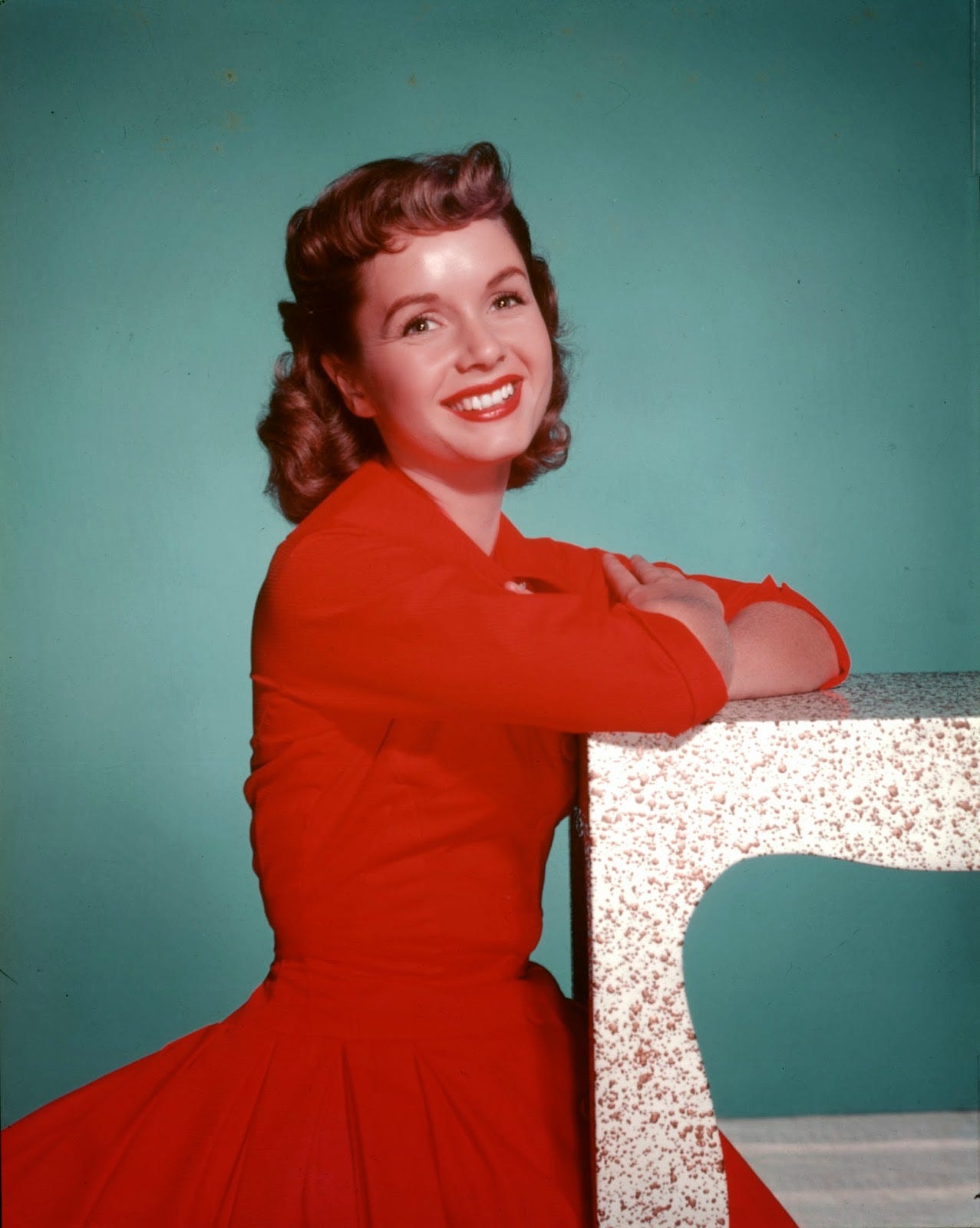
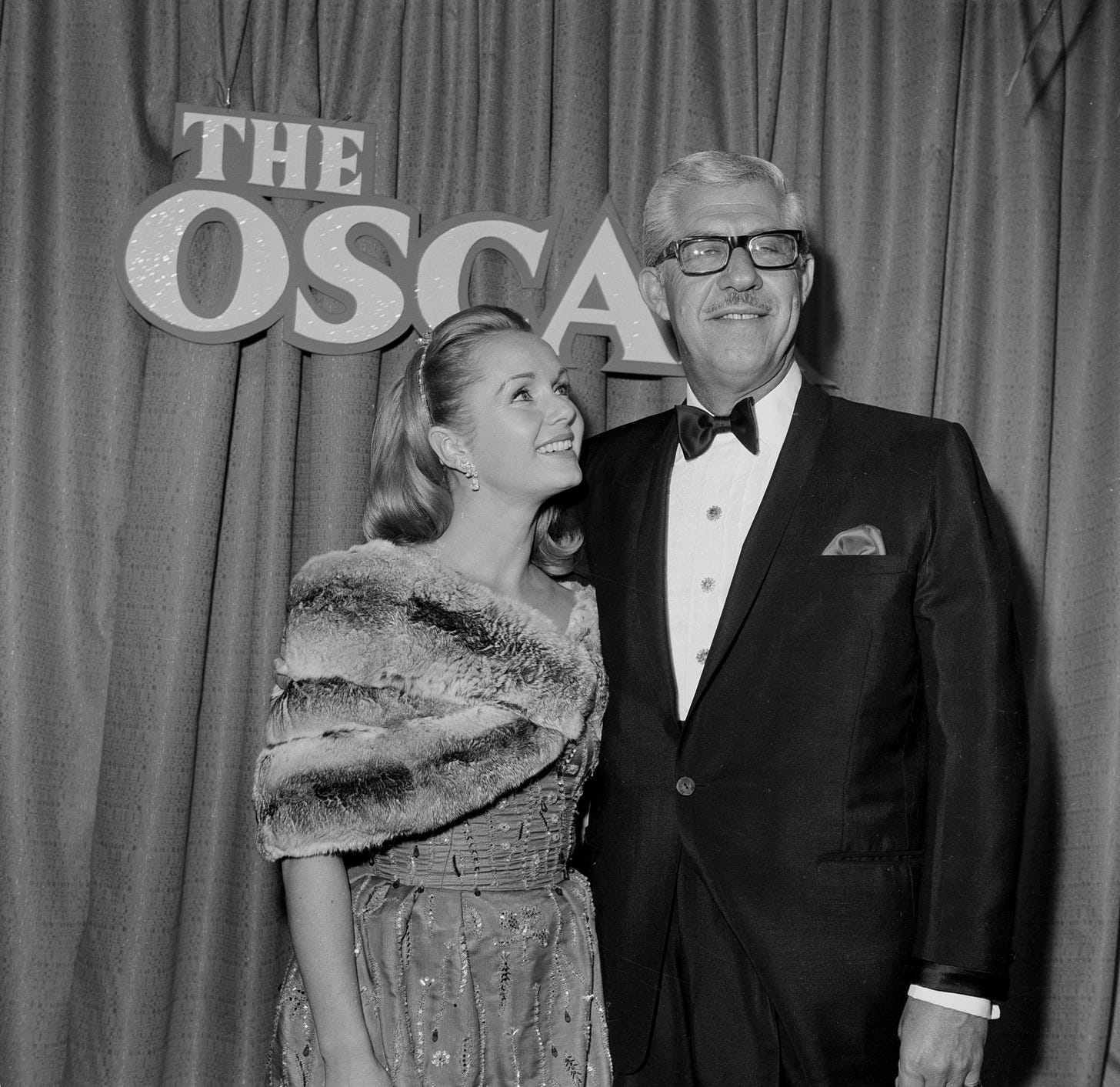
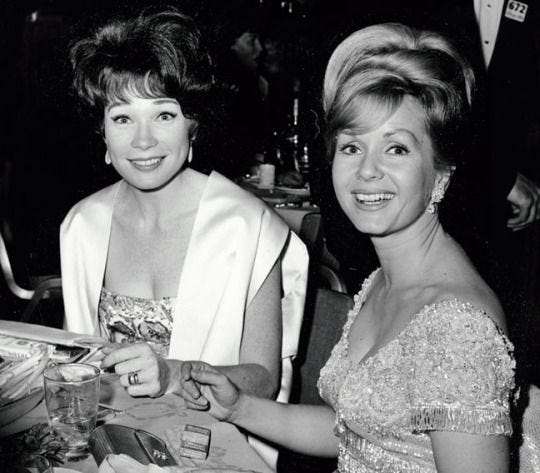
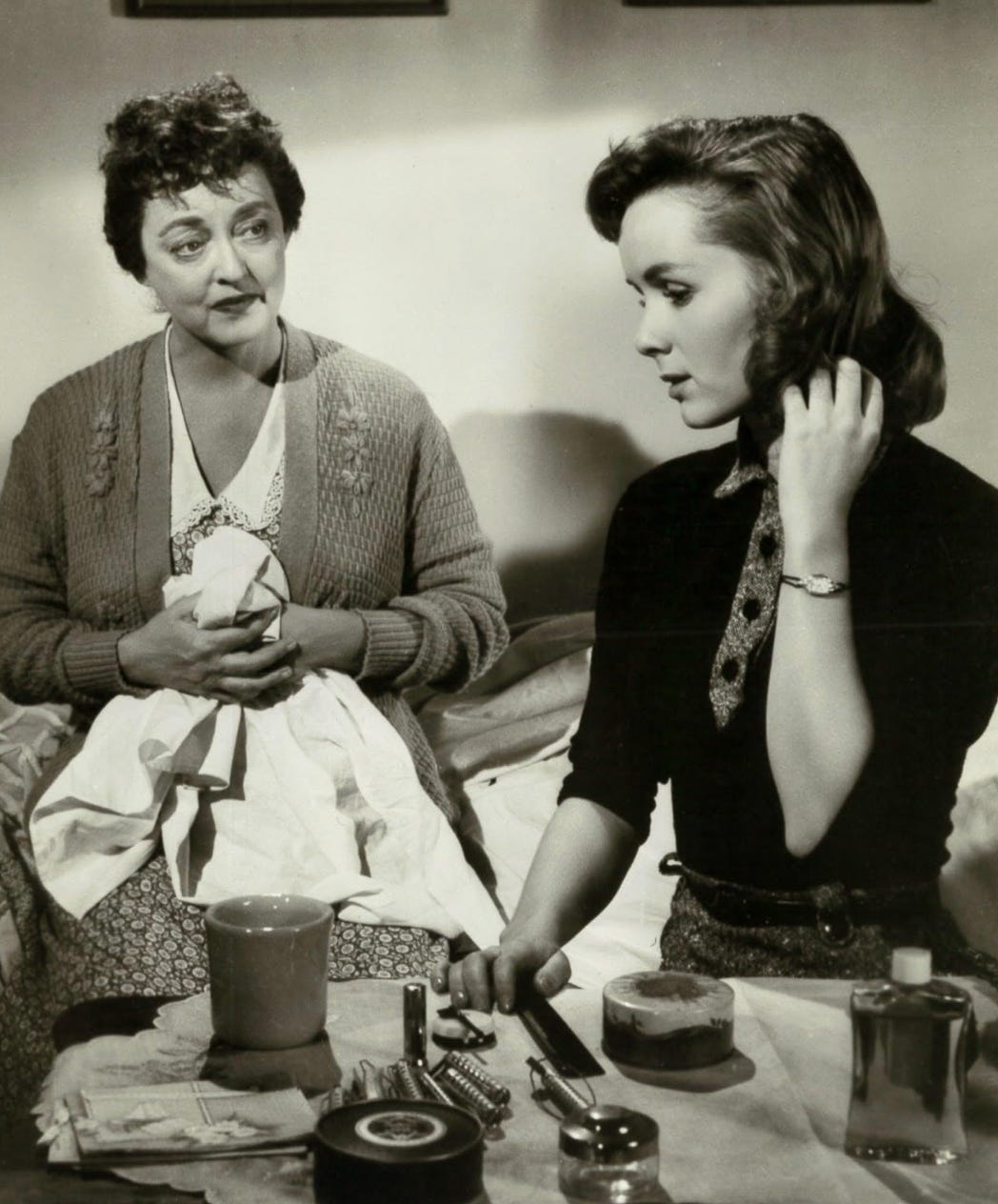

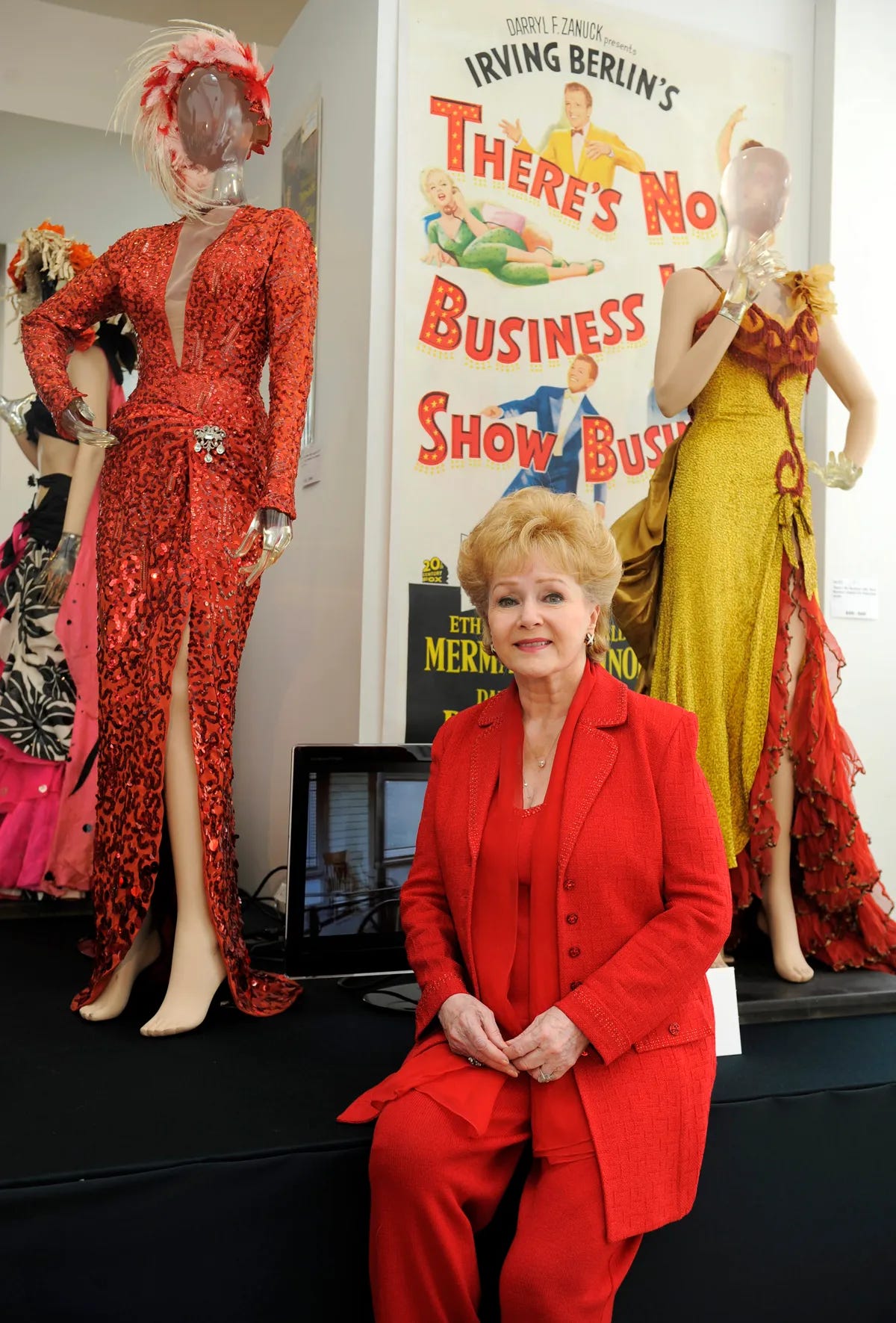

Thanks for that. It was an absolute treat after a long day.
I enjoyed that. Thank you. I think Meryl Streep did her best work in Postcards. It is one of my favorite films